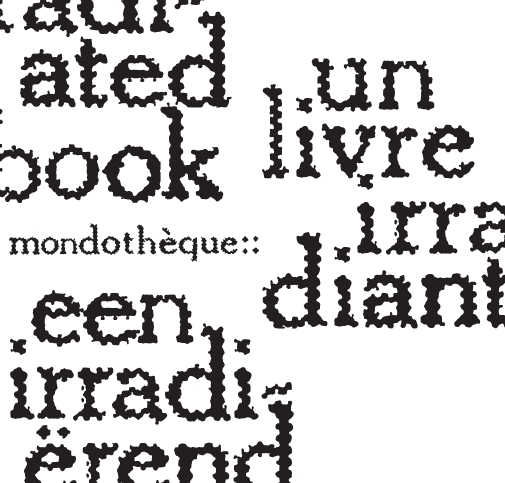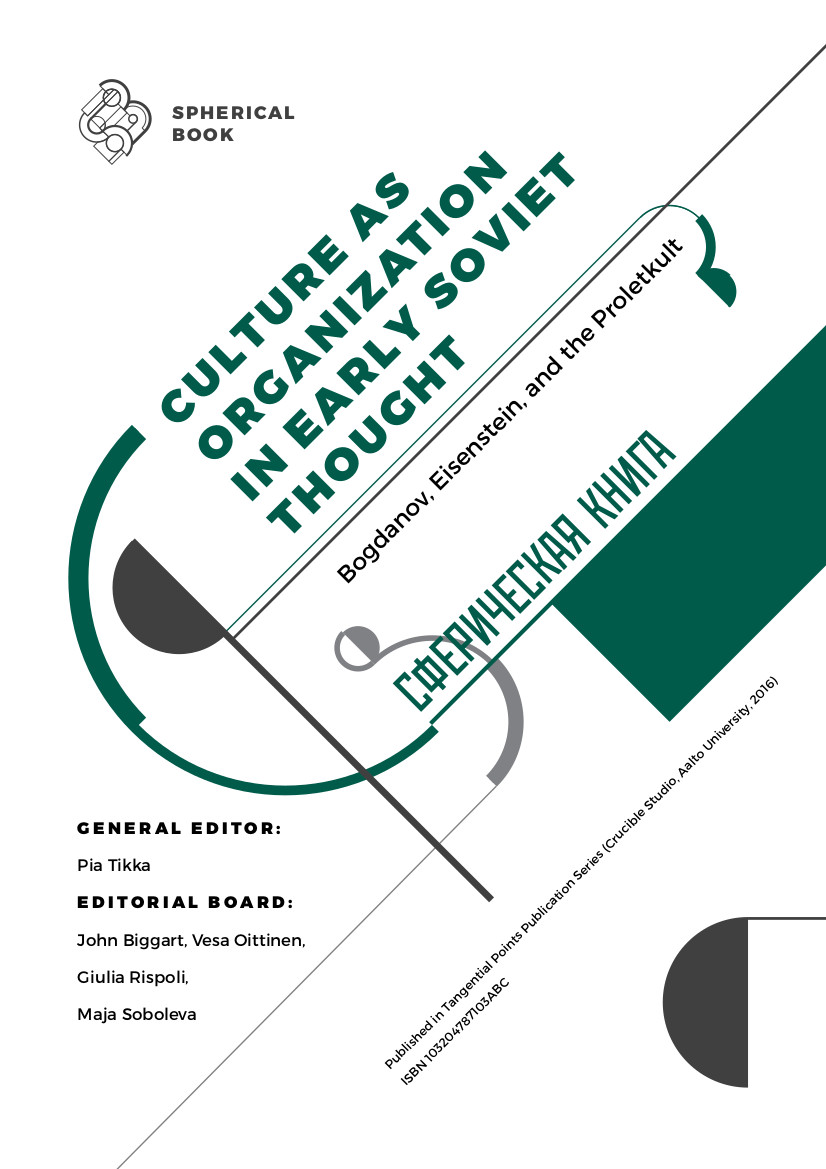Mondothèque: A Radiated Book / Un livre irradiant / Een irradiërend boek (2016) [EN, FR, NL]
Filed under book, wiki book | Tags: · architecture, archive, book, classification, data, document, google, internet, knowledge, library, web

“This Radiated Book started three years ago with an e-mail from the Mundaneum archive center in Mons, Belgium. It announced that Elio di Rupo, then prime minister of Belgium, was about to sign a collaboration agreement between the archive center and Google. The newsletter cited an article in the French newspaper Le Monde that coined the Mundaneum as ‘Google on paper’. It was our first encounter with many variations on the same theme.
The former mining area around Mons is also where Google has installed its largest datacenter in Europe, a result of negotiations by the same Di Rupo. Due to the re-branding of Paul Otlet as ‘founding father of the Internet’, Otlet’s oeuvre finally started to receive international attention. Local politicians wanting to transform the industrial heartland into a home for The Internet Age seized the moment and made the Mundaneum a central node in their campaigns. Google — grateful for discovering its posthumous francophone roots — sent chief evangelist Vint Cerf to the Mundaneum. Meanwhile, the archive center allowed the company to publish hundreds of documents on the website of Google Cultural Institute.
While the visual resemblance between a row of index drawers and a server park might not be a coincidence, it is something else to conflate the type of universalist knowledge project imagined by Paul Otlet and Henri Lafontaine with the enterprise of the search giant. The statement ‘Google on paper’ acted as a provocation, evoking other cases in other places where geographically situated histories are turned into advertising slogans, and cultural infrastructures pushed into the hands of global corporations.
An international band of artists, archivists and activists set out to unravel the many layers of this mesh. The direct comparison between the historical Mundaneum project and the mission of Alphabet Inc speaks of manipulative simplification on multiple levels, but to de-tangle its implications was easier said than done. Some of us were drawn in by misrepresentations of the oeuvre of Otlet himself, others felt the need to give an account of its Brussels’ roots, to re-insert the work of maintenance and caretaking into the his/story of founding fathers, or joined out of concern with the future of cultural institutions and libraries in digital times.” (from the Introduction)
Editorial team: André Castro, Sînziana Păltineanu, Dennis Pohl, Dick Reckard, Natacha Roussel, Femke Snelting, Alexia de Visscher
Publisher Constant, Brussels, Sep 2016
Free Art License 1.3
ISBN 9789081145954, 9081145959
225 pages
HTML (updated on 2019-5-31)
Git
PDF, PDF (43 MB)
Culture as Organization in Early Soviet Thought: Bogdanov, Eisenstein, and the Proletkult (2016)
Filed under book, spherical book | Tags: · cinema, film, film theory, montage, philosophy, proletkult, russia, systems theory, tektology, theory

“This anthology brings together a group of film researchers, historians, political scientists and systems scientists to discuss historical and contemporary tangential points between the sciences and the arts in Russia during the first decades of the twentieth century. All chapters provide new insights into linkages between the arts, philosophy and other disciplines during this period. Tangential points between early Russian systems thinking and approaches to montage that were being developed within the film community are examined in detail. The contributing authors focus on two thinkers: the filmmaker, Sergei M. Eisenstein and the systems theorist, Aleksandr A. Bogdanov.”
The book is published in an interactive format inspired by Eisenstein’s idea of the “Spherical Book”, organising chapters in a thematic modular way, allowing for multiple reading perspectives.
Edited by Pia Tikka, with John Biggart, Vesa Oittinen, Giulia Rispoli, and Maja Soboleva
Publisher Aalto University School of Arts Design and Architecture, Helsinki, 2016
Tangential Points series
ISBN 9789526000763
Armin Medosch: New Tendencies: Art at the Threshold of the Information Revolution, 1961–1978 (2016)
Filed under book | Tags: · art history, computer art, conceptual art, cybernetics, neo-avant-garde, new art practice, new tendencies, non-aligned movement

“New Tendencies, a non-aligned modernist art movement, emerged in the early 1960s in the former Yugoslavia, a non-aligned country. It represented a new sensibility, rejecting both Abstract Expressionism and socialist realism in an attempt to formulate an art adequate to the age of advanced mass production. In this book, Armin Medosch examines the development of New Tendencies as a major international art movement in the context of social, political, and technological history. Doing so, he traces concurrent paradigm shifts: the change from Fordism (the political economy of mass production and consumption) to the information society, and the change from postwar modernism to dematerialized postmodern art practices.
Medosch explains that New Tendencies, rather than opposing the forces of technology as most artists and intellectuals of the time did, imagined the rapid advance of technology to be a springboard into a future beyond alienation and oppression. Works by New Tendencies cast the viewer as coproducer, abolishing the idea of artist as creative genius and replacing it with the notion of the visual researcher. In 1968 and 1969, the group actively turned to the computer as a medium of visual research, anticipating new media and digital art.
Medosch discusses modernization in then-Yugoslavia and other nations on the periphery; looks in detail at New Tendencies’ five major exhibitions in Zagreb (the capital of Croatia); and considers such topics as the group’s relation to science, the changing relationship of manual and intellectual labor, New Tendencies in the international art market, their engagement with computer art, and the group’s eventual eclipse by other “new art practices” including conceptualism, land art, and arte povera. Numerous illustrations document New Tendencies’ works and exhibitions.”
Based on 2012 dissertation from Goldsmiths, University of London.
Publisher MIT Press, 2016
Leonardo series
ISBN 9780262034166, 0262034166
x+395 pages
Reviews: Oliver Schürer (Versorgerin, 2016, DE), Paula Barreiro López (Critique d’art, 2016, FR), Kristian Lukić (Furtherfield, 2017), Tomáš Glanc (Tech & Culture, 2017), Adair Rounthwaite (Art Bulletin, 2018), Adair Rounthwaite (Art Bulletin, 2018), Ivana Bago (ARTMargins, 2019).
HTML
PDF (added on 2022-10-11)

